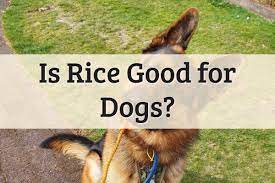Is Rice Good for Dogs: Exploring Canine Nutrition
When it comes to our furry friends’ nutrition, questions about what’s safe and beneficial often arise. One common query is, “Is rice good for dogs?” In this comprehensive guide, we will delve into the world of canine nutrition and rice’s role in it. Let’s uncover the facts to help you make informed decisions about your dog’s diet.
Understanding Dog Nutrition

Canine Nutritional Needs: A Primer
Before we address the question of rice, it’s essential to understand the fundamental nutritional requirements of dogs. Dogs, like humans, need a balanced diet to thrive. Their nutritional needs encompass:
Proteins:
Essential for muscle health and overall vitality.
Fats:
A source of energy and crucial for healthy skin and coat.
Carbohydrates:
Provide energy and dietary fiber for digestive health.
Vitamins and Minerals:
Necessary for various bodily functions.
Types of Rice for Dogs
Choosing the Right Rice: Brown vs. White vs. Other Varieties
Now, let’s address the rice question. Rice comes in various forms, and not all are created equal in terms of nutrition for dogs. The primary types to consider are:
Brown Rice:
Rich in fiber and nutrients, making it a popular choice for dog owners.
White Rice:
Easily digestible but lacks some of the nutrients found in brown rice.
Other Varieties:
Options like wild rice and basmati can also be suitable in moderation.
Benefits of Rice for Dogs
Rice as a Nutrient Source: What Dogs Gain
Rice can be a valuable addition to your dog’s diet, offering several benefits:
Energy Source:
Rice provides carbohydrates, supplying the energy dogs need for their daily activities.
Digestive Health:
The fiber in brown rice aids in digestion and can be soothing for dogs with sensitive stomachs.
Gentle on the Stomach:
White rice is easy to digest and can be helpful during bouts of digestive upset.
Potential Risks and Allergies
When Rice Isn’t Ideal: Risks and Allergic Reactions
While rice can be beneficial, it’s not suitable for all dogs. Consider the following:
Allergic Reactions:
Some dogs may develop allergies or sensitivities to rice, leading to digestive issues or skin problems.
Overconsumption:
Feeding excessive rice can disrupt a balanced diet, so portion control is crucial.
Balanced Nutrition:
Remember that rice alone is not a complete diet. It should be part of a well-balanced meal plan.
Rice in Special Diets
Rice in Dog Food: Special Diets and Veterinary Recommendations
In specific situations, veterinarians may recommend rice as part of a specialized diet for dogs:
Sensitive Stomachs:
Rice can be soothing for dogs with gastrointestinal issues, providing a bland yet nourishing option.
Recovery Diets:
After illness or surgery, veterinarians may suggest rice-based diets to aid in recovery.
Preparing Rice for Dogs
Cooking Rice for Canines: Tips and Recipes
If you decide to incorporate rice into your dog’s diet, it’s essential to prepare it properly. Here are some tips:
Plain Rice:
Avoid adding seasonings, spices, or sauces to the rice, as these can be harmful to dogs.
Cooking Methods:
Rice can be boiled, steamed, or prepared in a rice cooker. Ensure it’s fully cooked and free of any additives.
Serving Suggestions:
You can mix cooked rice with your dog’s regular food or serve it as a side dish.
Frequently Asked Questions (FAQs)
Is rice safe for dogs to eat?
Yes, rice is generally safe for dogs to eat in moderation. It can be a part of their balanced diet.
What are the benefits of feeding rice to dogs?
Rice can provide energy, aid in digestion, and be gentle on the stomach. It’s often used for sensitive or upset stomachs.
Can all dogs eat rice?
Most dogs can eat rice, but some may be allergic or sensitive to it. Always monitor your dog for any adverse reactions.
Is brown rice or white rice better for dogs?
Both can be suitable, but brown rice is often preferred due to its higher fiber and nutrient content.
How should I prepare rice for my dog?
Cook plain rice without seasonings or additives. Boiling, steaming, or using a rice cooker are common methods.
Can I mix rice with my dog’s regular food?
Yes, you can mix rice with your dog’s regular food to enhance their meal.
Is rice a complete diet for dogs?
No, rice alone is not a complete diet for dogs. It should be part of a balanced meal plan.
Are there any risks associated with feeding rice to dogs?
Some dogs may develop allergies or experience digestive issues. Portion control is also important to avoid overconsumption.
When should I consult a veterinarian regarding my dog’s diet?
Consult a vet if your dog experiences persistent health issues, or allergies, or if you’re considering dietary changes for specific needs.
Can rice be part of a weight management plan for dogs?
Yes, rice can be included in a weight management plan, but it should be monitored and adjusted under veterinary guidance.
Conclusion
In conclusion, the question of whether rice is good for dogs is not one-size-fits-all. Rice can offer benefits in terms of energy, digestion, and gentle nourishment. However, it’s essential to be aware of potential risks, especially allergies and overconsumption.




